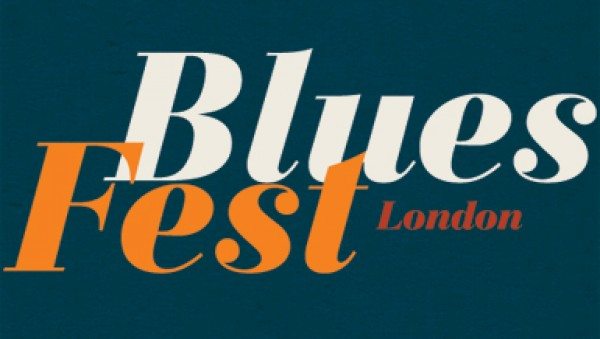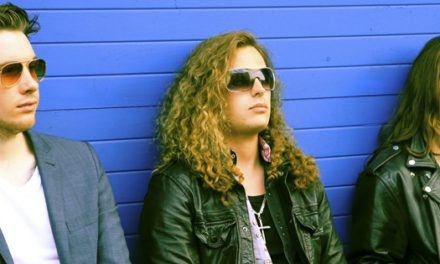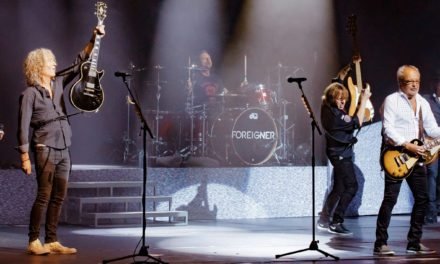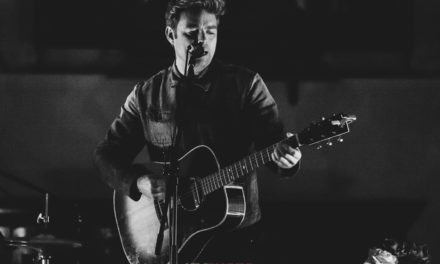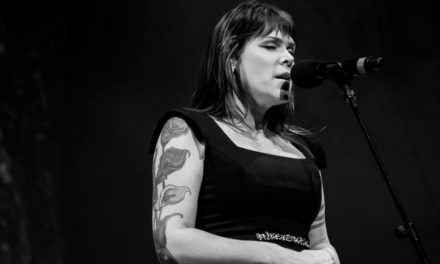Bluesfest 2013 Daytime Stroller Day 2
Wednesday 30th October
Arriving at The Royal Albert Hall with my friend Kieran White, we went to the box office to buy a pair of tickets for the daytime events before having a coffee in the Café Consort. As we looked at the day schedule, we noticed that the In Conversation… with veteran music journalist David Hepworth had been changed at the last minute from Danny Baker to Mark Ellen with no explanation given. It seemed a little confusing considering Danny’s name was on the promotional posters outside the venue. However, we still wanted to see the chat in the Coda Room.
Before we set off to explore what was on offer, I recognised some friends of mine in the café. It was the musician Ben Montague, his friend Michael Watts and his father Robert Montague CBE and founder of The North American Guitar company. All three were exhibiting the fantastic range of custom-made acoustic and electric guitars in the Coda Room every day for the entire week of Bluesfest. Offering a selection of guitars such as Carter Poulsen guitars and Scott Walker Electric guitars they have a wide range to satisfy many players and guitar aficionados. Visit them at www.thenorthamericanguitar.com
The Royal Albert Hall staff were helpful during the entire day and evening but at times seemed as lost as we were. The doors were a few minutes late opening but the quick and efficient bag searches did not disrupt the day.
As we walked around the grand building to the four rooms where the action was taking place (The Elgar Room, West Arena Foyer, Café Consort and Coda Room) the long corridors felt quite empty and it was reminiscent of being shown around a school on an open evening. The rooms were scattered all around and which meant there was a lot of walking and poor signage. Although the ‘Blues Ambassadors’ helped as much as they could, the event organisers had not made it easy to navigate the various attractions advertised. In future , if events are taking place in different rooms, perhaps a Bluesfest lanyard map could be included in the ticket price or sold separately at the merchandise stall. This was effectively used at The Victorious festival in Portsmouth this year.
We decided to go in search of Ronnie Wood & Chris Rea which was to be exhibited across all four days. Curiously, there seemed to be no Ronnie Wood artworks even though they advertised on the Bluesfest website. Chris Rea’s Blue Guitar paintings hung on the corridor walls but it wasn’t until a steward pointed to the walls that we even knew of their existence. This was because of the previously mentioned poor signage which meant that people would walk past the beautiful art without a second thought. As we carefully viewed the paintings we noticed Chris’s use of a ‘cracking’ effect in his work and how it bought his paintings to life for the spectator. The paintings had prominent influences of Van Gough’s work, in particular his ‘Starry Night’ through Chris’s use of colours. As I am not a scholar of art, I would not like to even try and interpret or dissect either the work or the artist himself. It’s not my place and I believe that the mystery that each piece possesses enhances the art.
After viewing Chris Rea’s work, we went downstairs to the West Arena Foyer where blues guitarist Marcus Bonfanti was to give a performance. I immediately recognised the room as I had been there for Caro Emerald’s after party at The Royal Albert Hall in March. The room itself is primarily used for after show functions and drinks and not electric blues shows.
It was futile to try and get a good spot as people had sat crossed legged on the floor directly in front of the stage thus blocking anyone from moving forward. Then at exactly two o’clock Marcus arrived onstage with his bass player and drummer. Plugging his guitar into the two Marshall Amp stacks behind him it took a bit of time to find the right sound. ‘This awful. I’m never playing here again!’ he joked before bursting straight into ‘Storm is Over’ with his distinctive vocals. ‘Comin for You’ was the definition of country blues with fierce guitar licks aplenty. The haunting drum on ‘Honey’ created the picture of driving down an American desert highway and wouldn’t be out of place in Hunter. S. Thompson’s ‘Fear and Loathing in Las Vegas.’
The title track from his new album ‘Alley Cat’ really flowed in this trio set up, whilst Honest Boy’s catchy chorus is extremely radio friendly.
Closing the set with ‘Gimme Your Cash’ (a song which he performed at Bush Hall during the first ever Bluesfest in 2011) he thanked the staff at the Royal Albert Hall for looking after them during the day and said goodbye to the crowd that was made up of all generations. Marcus Bonfanti is an able guitar player, no question. But his real talents lie in song writing especially in the tracks ‘Cheap Whiskey’ and ‘Jezabel’.
As he finished his set a little later than programmed, we said a quick hello to Marcus Bonfanti before quickly making our way up flights of stairs to the Coda Room for the second Hepworth Session of the week. Thankfully, this was a seated event so we could rest our legs from all the walking. The stage was surrounded by expensive electronic equipment provided by London company Sonata Hi-Fidelity (www.sonatahif.com) and Renaissance Audio (www.renaissanceaudio.co.uk) For any technical enthusiasts, the system comprised of VPI Scout 2 turntable, MOON 610 LP phono pre-amp, and MOON 700i integrated amp, all laced with the new Shunyata cables. (Try saying that after a few!)
The Coda Room was also exhibiting a series of large scale 3D facsimiles of classic 45s by British artist Morgan Howell. Each original is hand painted and unique such as The Rolling Stones 45 of ‘Brown Sugar.’ For more information visit www.supersizeart.com
David Hepworth informed the room that the first ever 45 single was ‘You Never Can Tell’ by Chuck Berry before asking everyone to move forward.
He then introduced himself and gave a brief description of the session format. ‘Welcome to the Chapel of Vinyl in the highest room of the Royal Albert Hall. I am the parson and I am visited by ‘priests’ (music industry/radio personalities) to discuss their favourite vinyl tracks and influences. Please welcome Mark Ellen.’
Mark Ellen walked in smiling and clutching a pile of rare vinyl. Ellen explained that when he was growing up in ‘dull’ Fleet, Hampshire (his words not mine) there was no real music scene. At age 14 he bought his first record, a second hand copy Chicken Shack’s ‘40 Blue Fingers, Freshly Packed and Ready to Serve’(1968) for ten shillings. ‘I believed it was a statement about me’ he commented. ‘Stan Webb’s gimmick if you like, was that at live shows he would walk off the stage and wouldn’t stop walking. The joke was that he would still be playing guitar in the car parks because he had the longest guitar lead. But he would get lost and be gone for a long time.’
Next, he mentioned ‘Crossroads’ (1961) by Robert Johnson. Mark clarified ‘He was king of the Delta Blues scene.’
The topic of ‘Crossroads’ directed Hepworth’s questioning to the band Cream: ‘Were you at the 2005 reformed Cream show at the Royal Albert Hall?’
‘Yes I was. It was the most expensive ticket I’ve ever bought at £125. The evening filled me with paralysed anxiety, like paying for a black cab ride from here all the way to Southend’ he mused.
‘Didn’t you run away and join the circus when you were younger?’
‘I did. I was looking for a job and noticed that the Hoffman Circus was in town. I went to them and asked and they replied ‘Well actually we do a have a position for the Ringmaster’s assistant. The Ringmaster had just had a nervous breakdown so they need help. At the shows I wore a bright red coat and would ride ‘the unridable mule’ which was the case. I would have to jump up high and just hold on!’
Howlin Wolf’s ‘Howlin Wolf Boogie’ (1952) was next. ‘This features a twenty year old Ike Turner on piano and a drummer. This song has no bass player because back then they weren’t as important as they are today. I think Howlin Wolf is the greatest blues singer ever and he was three hundred pounds in weight and 6’6 in height. I believe that is the reason why he sounded like he did.’
‘What was your most intimidating interview?’ David enquired.
‘Well I don’t want to speak ill of him now that he has passed but Lou Reed was pretty intense. Although it was nothing compared to my interview with Greg Allman. I loved the Allman Brothers and I went to their only European show. During the interview I asked him about his tattoos because he was covered in them. However, I think that some wires got crossed because Greg thought I was calling him a Confederate racist.’
Mark Ellen’s other choices included a record by Bert Jansch, ‘This song is only fifty eight seconds long and is more folk than blues’ Ellen explained. He then discussed the ten inch record ‘St James Infirmary*’ (1947) by Louie Armstrong. ‘Louie’s voice had changed so much over the years. But when he was in the big band, he used the idea of ‘soloing’, so whenever you hear a solo it is really down to Louie Armstrong.’
* ‘St James Infirmary’ is a blues standard and was performed at Wednesday’s early evening show by Van Morrison. Considering the song is about visit to a hospital, it is perhaps not the most uplifting of selections.
Stepping away from the vinyl selections, David Hepworth asked his friend about forgetting an important interview. ‘Do you remember when you forgot you had a phone interview with Tony Bennet?’
Ellen laughed and then discussed how it came about. ‘Well, I had an interview with Tony Bennet booked for that day but for some reason I had completely forgotten about. As it was around lunchtime I went out to get a sandwich.’ Hepworth then interjected ‘Whilst you were gone, I received a phone call from a man who said ‘Hi this is Tony Bennet. I’m calling for the interview with Mark Ellen. You were nowhere to be found!’
‘Well we sorted it in the end. But what is great about Tony Bennet is his voice has always sounded the same whatever he is doing. He has a beautiful rich voice. The incident reminded me of when I was a writer for a music magazine. I had been invited to see a three act bill at Alexandra Palace in London. The line-up was Muddy Waters, Chuck Berry and Johnny Winter and one of my colleagues from the same magazine had the opportunity to interview Muddy Waters before the show. So the interview took place in a black cab and went on for so long that Muddy Waters missed his cue to go on stage! People were chanting ‘Muddy’ and wondering where he was.’
Continuing the questioning about Mark Ellen’s life, the topic of his university days came up. ‘Were you in a band with Tony Blair?’
‘Yes I was. It was at St John’s College Oxford University in the seventies. We were called Ugly Rumours and the band’s name came from the cover of the Grateful Dead’s album ‘From the Mars Hotel’. I played bass and we all took turns singing. We decided that we needed a singer so a friend of mine said that there was this guy with long hair and his own pair of cowboy boots who could sing. We thought that he sounded amazing and didn’t even want him to audition. Tony insisted on coming to audition and performed ‘(I Can’t Get No) Satisfaction’ which he knew all the words too.
We were just having fun but Tony took it really seriously and would write sheaves of lyrics for the band. He also wanted us to rehearse and improve. He was obsessed with Mick Jagger and would walk on the stage wearing flares and strutting. But in the end we disbanded after six gigs.’
‘Would you ever reform?’ David asked.
‘Well Tony often tells me that he would love to get back together. I remember in 2005 when he was Prime Minister and he invited me to interview him about music. No politics at all. We were in the Presidential Suite of this hotel in Birmingham and we had an acoustic guitar with us. Tony had ordered dinner and the maid came into the room to find myself teaching Prime Minister Tony Blair the chords to ‘Wishing Well’ by Free!’ The audience laughed.
The last of Mark’s choices was ‘John the Revelator’ (1970) by Sonhouse, an American blues singer and guitarist who is noted for his emotional vocal delivery and slide guitar.
The conversation was entertaining but also extremely informative. Afterwards, we said hello and thank you to David Hepworth for the session and he was genuinely happy that we enjoyed the discussion. The ‘Hepworth Sessions’ would make for an interesting four-part radio programme series, which might actually happen because one of the official sponsors of Bluesfest London 2013 is BBC Radio 2.
As the daytime stroller drew to a close, we came to the conclusion that the shows we had seen were highly entertaining but felt that maybe some of the starting time performance- clashes could have been avoided.
The Bluesfest 2013 Official Programme read ‘Over four days and four nights, 34 acts, more than 200 musicians and more than 25,000 music fans will descend on the Royal Albert Hall for Bluesfest 2013- this is going to be a very special week.’
Yes it was a special week full of great music and exciting surprises. However, I feel that although they are important components it’s not the music, food, location or the weather that makes a festival great but the people. Every single person involved in this festival – the artists, the musicians, the venue staff, the promoters, the sponsors, the people behind the scenes and last but not least the audiences themselves is what helped make this festival a success.
As long as Bluesfest remembers that and listens to the feedback of the people, then Bluesfest 2014 should be better than ever.
By Glenn Sargeant
Mark Ellen’s book of memoirs are released on 14th April 2014
Thanks to Pete and Kieran

